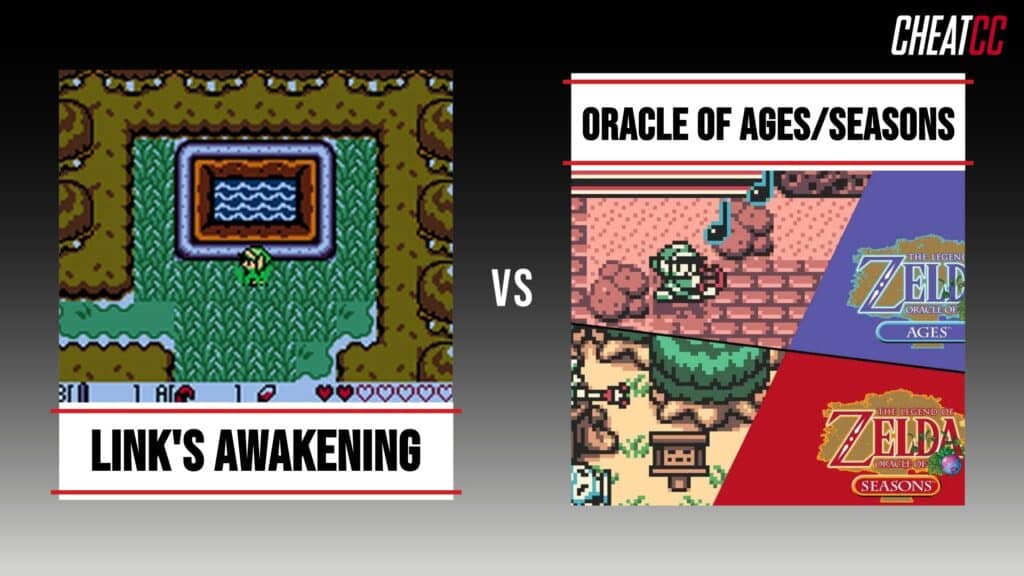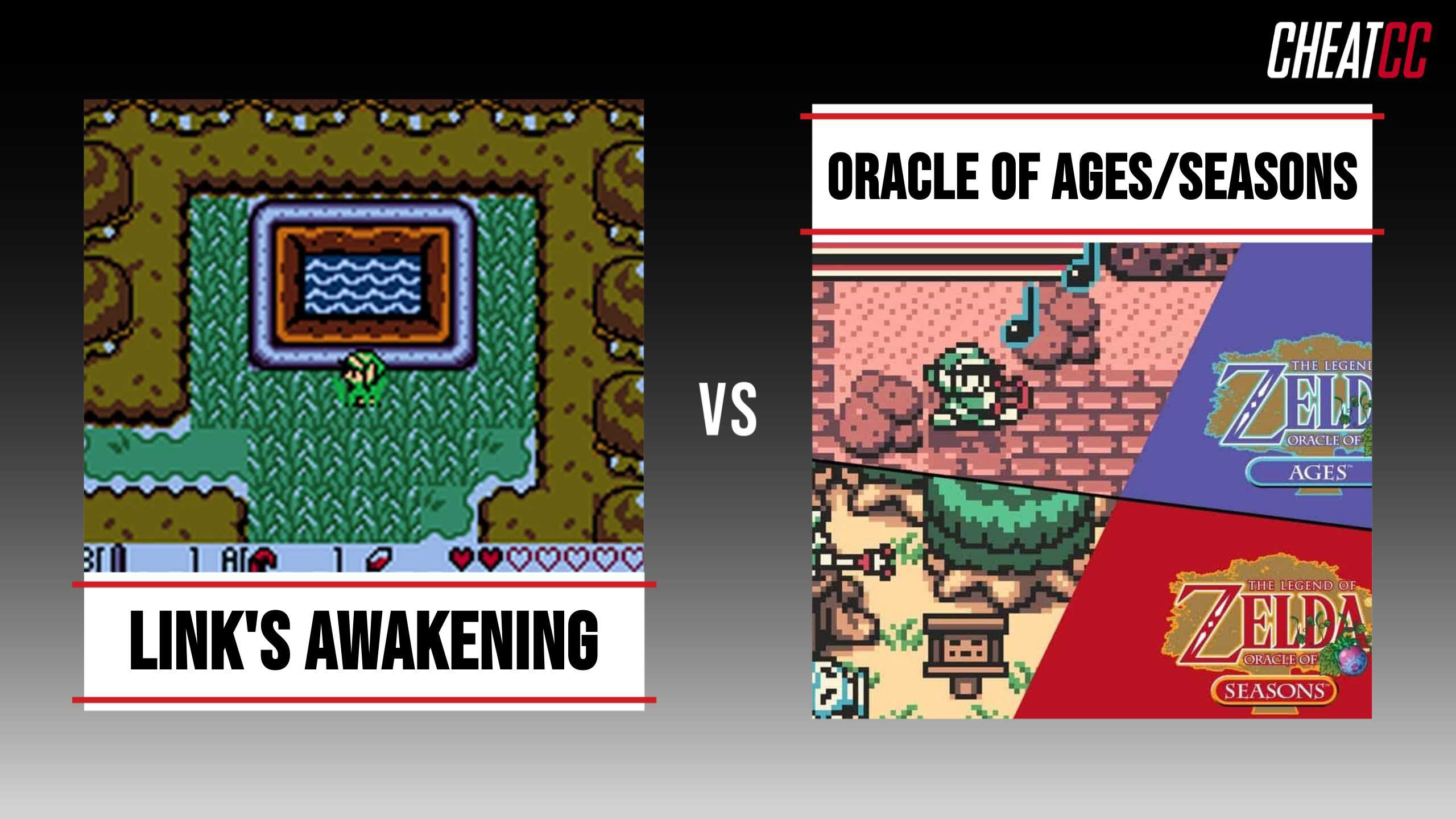Much like the series’ 3D adventures, the 2D games in The Legend of Zelda franchise have their definitive favorites among fans. Despite its 2D origins, The Legend of Zelda has more 3D mainline titles than 2D ones, but a potent mix of innovation and charm helps each of the 2D Zelda games to shine bright even when placed side-by-side with the more modern, best-selling Zelda games. Perhaps no other category of Zelda games help to illustrate this more than the Game Boy Color titles, making the battle of Zelda: Link’s Awakening vs Zelda: Oracle of Ages/Seasons a tough one to call.
Arriving in 1993 for the Game Boy, Link’s Awakening takes the format of A Link to the Past on SNES and successfully translates it into a compelling handheld adventure. Similarly, the Oracle games also adhere closely to the style and mechanics of the SNES Zelda adventure and Link’s Awakening, though they differentiate themselves by featuring some of the most complex combat and puzzle challenges of any handheld entry. All three titles are absolute classics and deserving of a place in the series’ “Hall of Fame”, but determining the “best” handheld title in the series means there can only be one clear winner.
Zelda: Link’s Awakening vs Zelda: Oracle of Ages/Seasons: Side-by-Side Comparison

Despite releasing several years apart, one could almost consider Link’s Awakening and Oracle of Ages/Seasons to be part of a trilogy, with the official series timeline even loosely connecting the three games. According to the Hyrule Historia compendium, the version of Link that players control in A Link to the Past is the very same incarnation of the hero that features in these three Game Boy Color classics, which each detail different adventures he finds himself a part of after saving Hyrule. However, a deeper inspection into Link’s Awakening and the duology of Oracle games reveals that they actually have some distinctive differences.
| Characteristic | Link’s Awakening | Oracle of Ages | Oracle of Seasons |
|---|---|---|---|
| Release Date | June 1993 | February 2001 | February 2001 |
| Release Platform | Game Boy | Game Boy Color | Game Boy Color |
| Re-Releases | 3 (Link’s Awakening DX on Game Boy Color, Virtual Console for 3DS, Nintendo Switch Online) | 2 (Vitual Console for 3DS and Nintendo Switch Online) | 2 (Vitual Console for 3DS and Nintendo Switch Online) |
| Remakes | 1 | N/A | N/A |
| First Handheld Zelda | ✅ | ||
| Total Sales | 12.51 million units | 3.99 million units (along with Seasons) | 3.99 million units (along with Ages) |
| Review Aggregate Score | 90% | 92% | 91% |
| Developer | Nintendo EAD | Flagship | Flagship |
| Number of Dungeons | 8 (9 in Link’s Awakening DX) | 8 | 9 |
| Follow-Up to SNES Zelda | ✅ | ✅ | ✅ |
| Available on Nintendo Switch | ✅ | ✅ | ✅ |
Zelda: Link’s Awakening vs Zelda: Oracle of Ages/Seasons: 5 Must-Know Facts
Here are 5 must-know facts about Link’s Awakening vs Oracle of Ages and Oracle of Seasons:
- Although both Link’s Awakening and Oracle of Ages/Seasons are published by Nintendo as first-party releases, the Oracle titles feature development by Flagship. Flagship is a development studio featuring talent from Capcom, Nintendo, and Sega, as well as funding from a joint collaboration between Capcom and Nintendo.
- Each one of the Game Boy Color Zelda titles have the distinction of earning review aggregate scores of 90% or higher, though one title stands out above the rest in terms of commercial success. Thanks to its various versions and re-releases, Link’s Awakening has more than 3 times the sales of the Oracle games.
- Only one of the three Game Boy-era Zelda titles has the honor of receiving a ground-up remake for modern hardware, with the Link’s Awakening remake from Nintendo and developer Grezzo arriving for the Nintendo Switch in 2019.
- All three of the Game Boy Legend of Zelda titles are now available as part of the Nintendo Switch Online service, with the Game Boy Color version of Link’s Awakening (Link’s Awakening DX) and both of the Oracle titles available in the Game Boy & Game Boy Color classic game collection as part of the basic subscription tier.
- Despite the Oracle games persisting as some of the fan-favorite titles in the series, the team behind them would only get one more Zelda title to develop. The Minish Cap was released on Game Boy Advance and, like the Oracle games, is a great and overlooked Zelda title with less-than-average sales.
Link’s Awakening vs Oracle of Ages/Seasons: Developer Differences
With Link’s Awakening being the first time an entry in the Zelda series would make its way to Nintendo’s incredibly successful Game Boy handheld, development duties fell to Nintendo exclusively through the Nintendo EAD studio. Conversely, the Oracle games feature development from Flagship, which was a studio founded in a joint venture between Capcom and Nintendo featuring plenty of veteran talent from both companies and from Sega. The difference in development studios is primarily obvious in the dungeon and combat design of the Oracle games, which tend to skew as more difficult in comparison to the relatively beginner-friendly Link’s Awakening.
Link’s Awakening vs Oracle of Ages/Seasons: Sales and Reception
While many fans have fond memories of both Oracle of Ages and Seasons, neither title reached the same sales figures as their predecessor. Both the Game Boy and Game Boy Color releases of Link’s Awakening hold an impressive 3.83 million and 2.22 million copies sold, respectively. In comparison, the cumulative sales of the Oracle games total 3.99 million, marking their individual sales as falling below that of Link’s Awakening. Further, the remake of Link’s Awakening for the Nintendo Switch is a massive success, with sales nearing 6.5 million. All together, the first handheld Zelda outsells the Oracle games at a rate of 4-to-1.
Link’s Awakening vs Oracle of Ages/Seasons: The Remake
Speaking of remakes, Link’s Awakening is the only game of the three Game Boy/Game Boy Color-era Zelda games to receive a ground-up remake for a modern console. Many fans continue to call for the Oracle games to receive a remake in the same style as Link’s Awakening, but the middling sales of those titles all but guarantees that desire as a pipe dream for the games’ fanbase. The remake of Link’s Awakening is also one of the greatest contributors to its overwhelming commercial success, accounting for just over half of the game’s almost 13 million units in sales. Interestingly, the development of the remake is handled by none other than Grezzo, which is an independently contracted studio featuring on many first-party Nintendo games much like the Oracle games’ developer Flagship.
Link’s Awakening vs Oracle of Ages/Seasons: Reliving the Past on Nintendo Switch
It practically goes without saying that the handheld 2D Zelda titles are some of the most beloved games in the series, with sterling critical reception and strong sales figures to back up that sentiment. It should come as no surprise, then, that Link’s Awakening and both Oracle games are now available as part of the Nintendo Switch’s impressive classic game collection libary included with a subscription to Nintendo Switch Online. Players who happen to have missed playing the Game Boy Color Zelda classics now have access to all three games courtesy of the standard tier subscription to Nintendo Switch Online, and the games even include quality of life features such as save-states and rewind to make playing them on the Switch preferable over native hardware.
Bottom Line
Between both of the Oracle games and the excellent (and criminally overlooked) Minish Cap, the trio of titles featuring development talent of both Nintendo and Capcom are some of the best games in the series. That said, few 2D entries in the entire Zelda franchise come close to the critical and commercial success of Link’s Awakening, and that it’s the only mainline entry in the series to receive a full remake speaks volumes about the fan appreciation for the game. Regardless of which version of Link’s Awakening players happen to experience first, it stands as one of the best games in the entire Zelda series (2D or otherwise), and for that reason alone it deserves the crown for Best Handheld Zelda Title.
